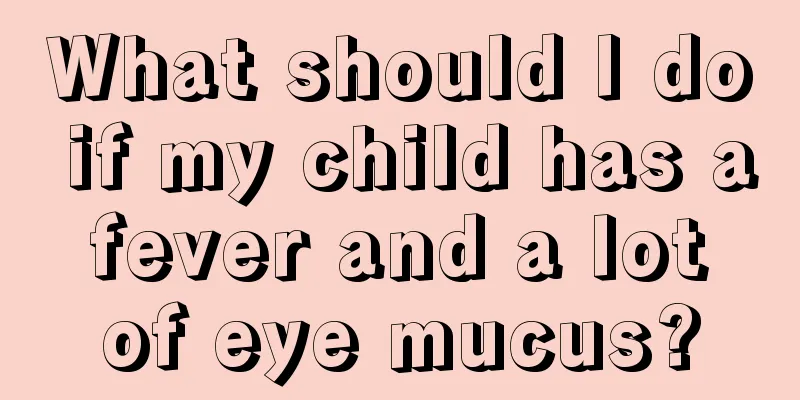What is pneumonia in babies?

|
Nowadays, every child is the treasure of the family, so the health of the child has become the most concerning issue for parents. However, recently many parents have reported that their children have pneumonia, so they are very worried, but there is no solution. So today we will introduce to you what baby pneumonia is. What should we do when we encounter this situation? Causes 1. Neonatal aspiration pneumonia The chemical inflammatory reaction/secondary infection in the lungs of newborns due to inhalation of amniotic fluid, meconium or milk is collectively called neonatal aspiration pneumonia. (1) Amniotic fluid aspiration pneumonia is a fetal distress caused by obvious intrauterine hypoxia. When gasping occurs, the exfoliated epithelial cells in the amniotic fluid block the terminal airways, causing dyspnea, followed by chemical inflammatory changes in the lungs or secondary infection. (2) Meconium aspiration pneumonia ① In cases where the gestational age is >42 weeks, the incidence of meconium staining of the amniotic fluid exceeds 30%, while in cases where the gestational age is <34 weeks, meconium is rarely discharged into the amniotic fluid. Meconium-stained amniotic fluid was once used as a synonym for fetal distress, but it is not very correlated with Apgar score, fetal heart rate abnormalities, umbilical cord blood pH, etc. Therefore, meconium-stained amniotic fluid with fetal heart rate abnormalities is a sign of fetal distress and perinatal complications. ② Normal intrauterine respiratory activity of the fetus will not lead to aspiration of meconium, but when fetal distress caused by obvious intrauterine hypoxia occurs and gasping occurs, meconium may enter the small airways or alveoli. Clinically, severe meconium staining of the amniotic fluid, tachycardia, and low umbilical artery pH all indicate the possibility of meconium aspiration and require active intervention. 2. Neonatal infectious pneumonia Prenatal and intrapartum infections are transmitted through amniotic fluid or blood. The causative microorganisms are similar to pneumonia caused by intrauterine inhalation of contaminated amniotic fluid. Bacterial infections are more common with Gram-negative bacteria, in addition to viruses such as group B streptococci, Chlamydia trachomatis, Ureaplasma urealyticum and CMV (cytomegalovirus). Postpartum infection can be easily transmitted to newborns when people who have direct contact with infants suffer from respiratory infections; in the case of omphalitis, skin infection and sepsis, pathogens can be transmitted to the lungs through the bloodstream and cause pneumonia; medical incubators, suction devices, nebulizers, endotracheal tubes, etc. are not strictly disinfected, medical staff have a weak sense of sterility and do not wash their hands frequently, and the transfusion of blood products containing viruses such as CMV and HIV can all cause illness. High-risk factors for nosocomial infection: ① birth weight <1500g; ② long-term hospitalization; ③ overcrowded wards and lax disinfection system; ④ too few nurses; ⑤ poor aseptic concept of medical staff. The above are some symptoms and simple treatments of baby pneumonia introduced to us by professionals. Therefore, parents who are still troubled by this problem may wish to refer to the content above. Parents should also pay more attention to their children's physical condition. If a disease occurs, immediate treatment is needed, but medication should not be used blindly. I hope the above content can help you. |
<<: What should I do if my baby has diarrhea and fever?
>>: What to do if your baby has a high fever
Recommend
Newborns fart loudly all the time
It is very common for newborns to fart. Some newb...
What should I do if my child has a runny nose and cough?
Once a child has symptoms such as runny nose and ...
Symptoms of cough due to indigestion in children
Most children who are too young cannot eat by the...
Can babies supplement calcium by eating dried shrimps?
The growth of the baby is very important, so pare...
How to treat a baby's stomach problems
Almost every baby will have gastrointestinal prob...
Don’t take children’s ADHD symptoms lightly!
Attention Deficit Hyperactivity Disorder (ADHD) i...
How to diagnose and treat abdominal lymph nodes in children
Children's abdominal lymph nodes may be the p...
What is the head circumference of a 2-year-old baby?
The healthy growth of the baby is very important ...
What should I do if my child is allergic to fish? Just do this and that's enough
Fish is a very healthy and nutritious food. Eatin...
Why is my baby's tongue red?
It is quite common for babies to have a red tongu...
Is it good for newborns to bask in the sun to treat jaundice?
The problem of jaundice in newborn babies can be ...
Two-year-old baby's legs are not straight
Parents should observe their baby's body shap...
Can sunbathing cure jaundice in newborns?
We often find that newborns will develop varying ...
What should I do if my child has skin allergies, redness, and swelling?
Many children will accidentally have skin allergi...
Causes of lymphadenitis in children
Lymph node inflammation in children is a very com...









